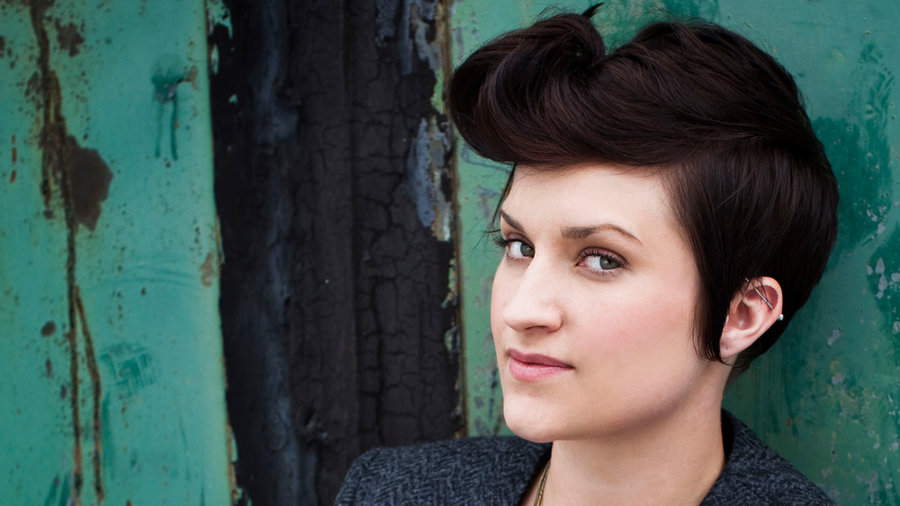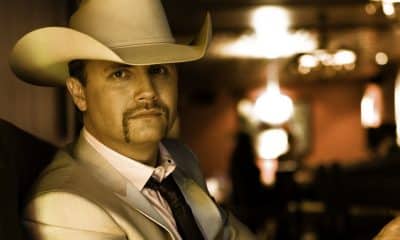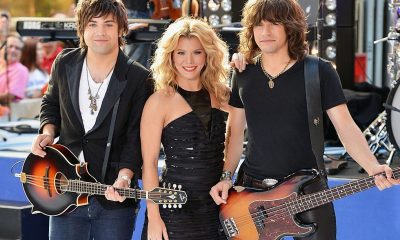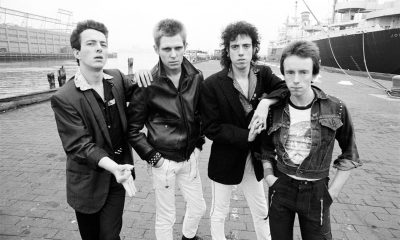Interviews
Interview: Newcomer Megan McCormick Offers Honest Words On Her Debut Album

Megan McCormick doesn’t make the kind of lo-fi indie rock that hipster music blogs love to love, but don’t presume that the lack of coverage from leading publications like Pitchfork, Hear Ya and Daytrotter—all of which have ignored McCormick’s debut release—means the project’s not worth hearing. Honest Words is a powerful 12-song collection that showcases a 24-year-old singer, songwriter and lead guitarist who is exceptionally talented in all three areas.
A blues-informed fusion of modern alternative and classic rock, the album showcases McCormick’s smoky voice, incisive lyrics and some of the best guitar work set to record in 2010. McCormick spoke with American Noise about growing up in tiny towns, her extensive and unlikely stretch as a student of bluegrass, and her stellar new album, which is now available.
AMERICAN NOISE: I know that you grew in is Wasilla, Alaska, because one of the press releases I received about you was all about drawing comedic parallels between yourself and another former Wasilla resident, Sarah Palin. Tell me about growing up in that tiny town—how did the setting influence you, both personally and musically?
MEGAN McCORMICK: The very first part of my life was spent in north Idaho, in actually a much smaller town than Wasilla. On a social level, I’ve never really identified with any of the places I’ve lived. I do identify with Nashville, where I live now, but I’m also ready to move to a bigger city, like Chicago or somewhere like that.
On a musical level, living in those places certainly gave me a lot of time to spend playing the guitar. There was a lot of time alone, and I’d spend that time practicing and listening to music. I think that was the biggest effect that kind of environment had on me.
AMERICAN NOISE: There must not have been many places, in towns that small, to experience live music. Stylistically, who were were you most influenced by?
McCORMICK: My musical roots and influences came from my family. My grandparents on both sides played music. But, on my mom’s side, my grandparents are in the Western Swing Hall of Fame. All of my aunts and uncles played music, and so did my mom and dad. Everybody played music. So, not only was it the music that they played and that I was surrounded by in my home, but also the music that they would listen to as musicians and as music lovers.
So, although there weren’t a lot of venues—and although there wasn’t a lot of live music to see aside from my family—there was plenty of music going on. And, it was a very well-rounded range of styles. There was the swing and jazz thing that my grandparents did, as well as some rock and roll and classic country.
AMERICAN NOISE: When you left that small town in Alaska, you moved to Johnson City, Tennessee.
McCORMICK: Yes.
AMERICAN NOISE: For anyone who isn’t familiar with Johnson City, it’s a little place just south of the Virginia state line, and about a five hours’ drive from Nashville. It’s right in the heart of bluegrass country, and I know that you have some experience with bluegrass. I’d like you tell me about that experience, and about how you ended up going from Alaska to Johnson City. Because you’re not, by any stretch, a country or bluegrass singer.
McCORMICK: When I moved to Alaska, that was the first time I was exposed to bluegrass and Irish music. I was just really taken by those kinds of music. It felt like something that I had to figure out. The style of flatpicking the guitar, as you do in Bluegrass or Irish music, was so difficult for me. I had only played electric guitar leading up until then. I started on electric, learning riffs by people like Stevie Ray Vaughan, Jimi Hendrix and Bonnie Raitt. Then, I heard this new style and was like, “This is so hard. I have to figure it out!”
I started playing bluegrass, and practiced more than I had ever practiced. And I knew this guy, a fellow musician in Alaska, who got a scholarship to go study bluegrass as East Tennessee State University, which is in Johnson City. It’s the only four-year university in the world that has an extensive study or program in country, bluegrass and old time music. The only place in the world.
So, that was the place to go if that’s what you wanted to [learn]. I ended up applying for the school, and applying for the scholarship. I got all of that together when I was 16, and by the time I got there I had just turned 17. I was studying it, and playing a lot of bluegrass. I was playing in a bunch of bluegrass ensembles. Honestly, that style of music really kicked my ass. From a technical perspective as related to the guitar, it really made me get my shit together.
AMERICAN NOISE: There are many styles and influences evident on your album Honest Words, but bluegrass isn’t one of them.
McCORMICK: As a listener, I definitely wouldn’t listen to the record from top to bottom and then be like, “Oh yeah, she’s spent time studying bluegrass music.” I mean, there are some songs that are somewhat similar, like “Oh My Love.” That song has some country vibe to it.
I guess it was really more of a long-term field trip that I took, musically. When I started playing music, I was playing the kind of music that I’m back to playing now. What I play now is what I was always most passionate about.
I guess I took such a long hiatus from that to focus on the bluegrass thing because I wanted to learn how to manipulate my tone. I wanted to learn how to affect the sound of my guitar on my own, without having to rely on gadgets.
I mean, you’ll go and watch some electric guitar players, and they have this massive soundboard full of shit that they need because they don’t know how to alter the sounds on their own. I just really wanted to get to know the guitar a little better.
AMERICAN NOISE: Did you always know that your music would come back to its origins?
McCORMICK: I think I knew that the experience would be temporary. I knew that based on my level of passion for it. I was very passionate about the learning of it, but I also knew that that style and that community made me neglect everything else. There was so much outside of the bluegrass world that I loved and was passionate about—and that I knew I couldn’t live without.
And, from a career perspective, I had always had it in my mind that this is what I was going to do professionally, and that I was going to do it on a long-term scale. I never looked at it like, “Oh, I can’t wait to have my fifteen minutes of fame.” I’ve always looked up to performers like Bonnie Raitt, or even someone like Alejandro Escovedo, who I’ve been playing with a lot recently. I look up to players like that, who are in their 60s and still kicking ass. I’ve always really wanted that.
I quickly saw that in the bluegrass scene it’s really difficult to make a lasting impression, and also to make any money. I’d like to be doing this for 30-plus years, and that just didn’t seem like a sustainable career option. That was maybe another reason why I knew it was temporary.
AMERICAN NOISE: You mentioned earlier that you moved to Johnson City when you were 17. Had you finished high school early?
McCORMICK: I dropped out of high school. We had relocated at a strange time. I was in eighth or ninth grade when my family moved from Iowa to Alaska. It was a tough age to try to fit back in to a brand new crowd, and I was hyperfocused on music. I was eager to get started. I wanted to get my career going. I felt ready for the next step. And I really didn’t see the purpose in spending another two years in Wasilla.
So, I dropped out of high school and took an equivalency exam, and I got a diploma from the state. I was accepted to college and awarded the scholarship before I ever really even seriously asked my mom. I guess I wanted to have some ammunition.
When I came to her about it, I was able to be like, “I really want to move, and I think you should let me because I’ve already been accepted and I’ve been awarded this scholarship. This is the next step for me. ”
AMERICAN NOISE: Was your mom supportive?
McCORMICK: I think it was very difficult for her. I think it was hard for her to let me do that. That was a while ago, but I’m 24 now, and looking back…I would be very…
Whenever I hang out around 16 year olds these days, I think “Damn, I certainly thought I was mature when I was 16.” I remember the way I felt in my head. And I’m thinking, when in those moments, “There’s no fucking way I’d let my kid move across the country.” Across two countries, for that matter.
AMERICAN NOISE: Your new album, your first full length album, is called Honest Words. Take me into the studio. What did you hope to achieve when recording this album?
McCORMICK: We went in and we tracked eleven of the twelve songs live, in the span of about a week. We captured all of the drums, bass and guitars live. You know, if there was a take that was absolutely amazing but had one little thing wrong with it, we’d go and touch that up. But the majority of the album was recorded live.
I really wanted this album to feel like a band endeavor. It is my album, and these are all my compositions, and my vision. So, I wanted the guys on the record to be the guys I play with live. I wanted it to feel like the performance feels like. At least for this album.
It won’t be that way for every album I ever make. I think there is a time to take advantage of the studio, and there is a time when it’s ok for albums to be different than the live performance. But, for this one, I wanted it to be a really genuine effort. Like, “Ok, here—this is what I do. And this is what it sounds like.”
AMERICAN NOISE: Where does your music fit, socially? Honest Words is a bit left of the indie rock center. What’s your scene, who’s your audience and what’s your place in the grand musical landscape?
McCORMICK: I wouldn’t label [my music] as indie rock, even though I see why that descriptor comes up for me. I think it’s a bit more classic-rock informed, a bit more adult contemporary.
It’s been such a broad range of people that the music has connected with. On the last tour that I was on, I had a 14-year-old girl come to one show, and she was super pumped about it because she wants to learn to play guitar. And there aren’t that many female lead guitar players.
Then, I met a 65-year-old that said the music reminded him of what he used to listen to but hasn’t heard anybody come out with in a long time.
AMERICAN NOISE: What’s your best case scenario for this album? Are you going to sell a million copies? Are you going to chart five hit singles from it? Or will you be playing shows for a couple of hundred people?
McCORMICK: I want a healthy, strong introduction. We’re servicing the album to radio right now, and we’re going with non-commercial radio and Triple A radio. It’s my hope that later this fall, we’ll have the opportunity to expand that to the Hot AC stations.
I think this album has legs. I think people who get to hear this record are going to enjoy it. I believe in it. I’m proud of it. It’s just a matter of getting people to hear it. So, I think it’s gonna be a slow build. But I also think that’s what I prefer. I like to know I had a sturdy footing.
- Lists13 years ago
Top 10 Country Music Albums of 2010

 Interviews5 years ago
Interviews5 years agoJohn Rich – The Interview

 Song Reviews16 years ago
Song Reviews16 years agoTaylor Swift – “Love Story”

 Interviews5 years ago
Interviews5 years agoHoneyhoney on Hiatus: Revisit our 2008 Interview with Suzanne Santo

 Album Reviews14 years ago
Album Reviews14 years agoAlbum Review: Miley Cyrus – Can’t Be Tamed

 Song Reviews6 years ago
Song Reviews6 years agoThe Band Perry – “Hip To My Heart”

 Columns5 years ago
Columns5 years agoThe Link Between Folk Music’s Past and Present

 Columns5 years ago
Columns5 years agoIs Marketing Killing Rock and Roll?

